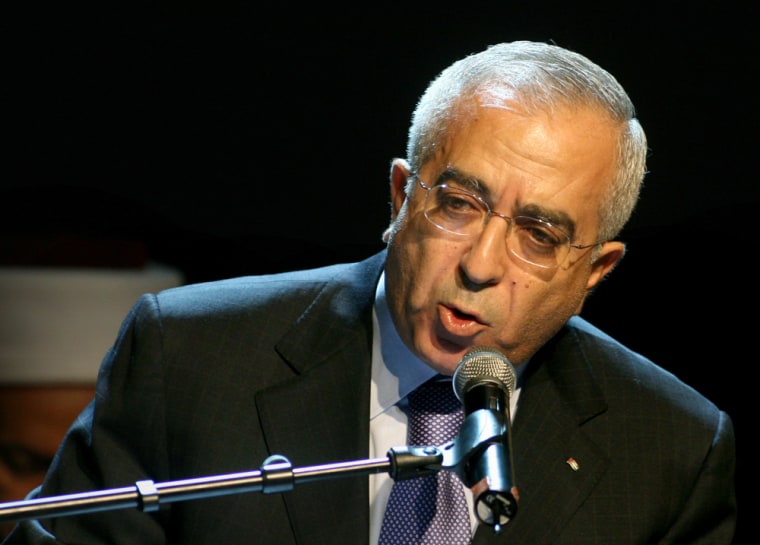The new Palestinian prime minister delivered a stern warning Thursday to hundreds of Islamic preachers, including Hamas supporters: He won’t tolerate calls for violence delivered from mosque pulpits and plans to collect militants’ weapons.
Salam Fayyad’s meeting with some 800 Muslim clergy marked the latest attempt to stem the influence of Hamas in the West Bank following the Islamists’ violent takeover of Gaza this month. Security forces have arrested dozens of Hamas activists in the West Bank, and President Mahmoud Abbas is trying to dry up funding to Hamas with a review of all private organizations.
But Fayyad’s crackdown on Hamas was complicated by Israel’s hunt for gunmen from Abbas’ Fatah movement in the West Bank city of Nablus. “We view this aggression as a way to undermine our efforts to provide security and end the chaos,” Fayyad said.
Israel described the operation as a routine one targeting militants involved in plots to carry out attacks, and said troops found weapons and explosives in Nablus. Five Israeli soldiers were wounded by bombs as they moved from home to home through the densely populated Old City. Tens of thousands of residents were confined to their homes by a curfew.
Israeli Prime Minister Ehud Olmert has promised to bolster Abbas’ government in his struggle with Hamas. Olmert’s spokeswoman, Miri Eisin, said the Israeli government is committed to working with Abbas, but would not risk the safety of its own citizens. “We will go forward with full strength to strengthen Abbas, and full strength to stop the terror,” she said.
Weapons for books?
This week, Abbas issued a decree barring militants from carrying weapons, but it is doubtful he will be able to disarm Fatah’s violent offshoot, the Al Aqsa Martyrs’ Brigades. Fatah gunmen said they need their weapons for future confrontations with Hamas and Israel, and will not surrender them. Previous attempts to collect illegal weapons ended in failure.
In his meeting with clergymen Thursday, Fayyad was accompanied by Abbas’ top security official, Interior Minister Abdel Razak Yehiyeh. “We will collect weapons and replace them with pens and books,” the minister told the crowd. “The phenomenon of militants is very dangerous, and we want to stop it in all forms.”
Fayyad told the preachers to take politics out of their sermons. “We won’t allow them (mosques) to be turned into places of incitement and intimidation,” he said. “It’s the responsibility of men of religion to ... present religion as a way of tolerance, not as a cover for bloodshed.”
Hamas is influential in many mosques in the West Bank and Gaza, and has been using Friday sermons as a vehicle for spreading its hard-line message. Preachers have also been actively involved in politics.
Our own message
In Nablus, seven of eight Hamas members of parliament are preachers, said Suhair al-Dubai, a moderate clergyman from the city.
“The government has realized how important the mosques are in forming and leading public opinion,” said al-Dubai, who attended the meeting with Fayyad. “But Hamas is very well organized in mosques ... The government can restrict them, but not eliminate them because they are part of a structure and can always find a way to play a political role.
Mohammed Abu al-Hasan, a Hamas preacher from the West Bank town of Jenin, said clerics would continue to speak their minds, regardless of any government directive.
“We will not accept these restrictions and we are going to respond with our own message in this Friday’s sermons,” he said. “Fayyad is a politician, he can handle political issues and we...can handle religious issues.”
